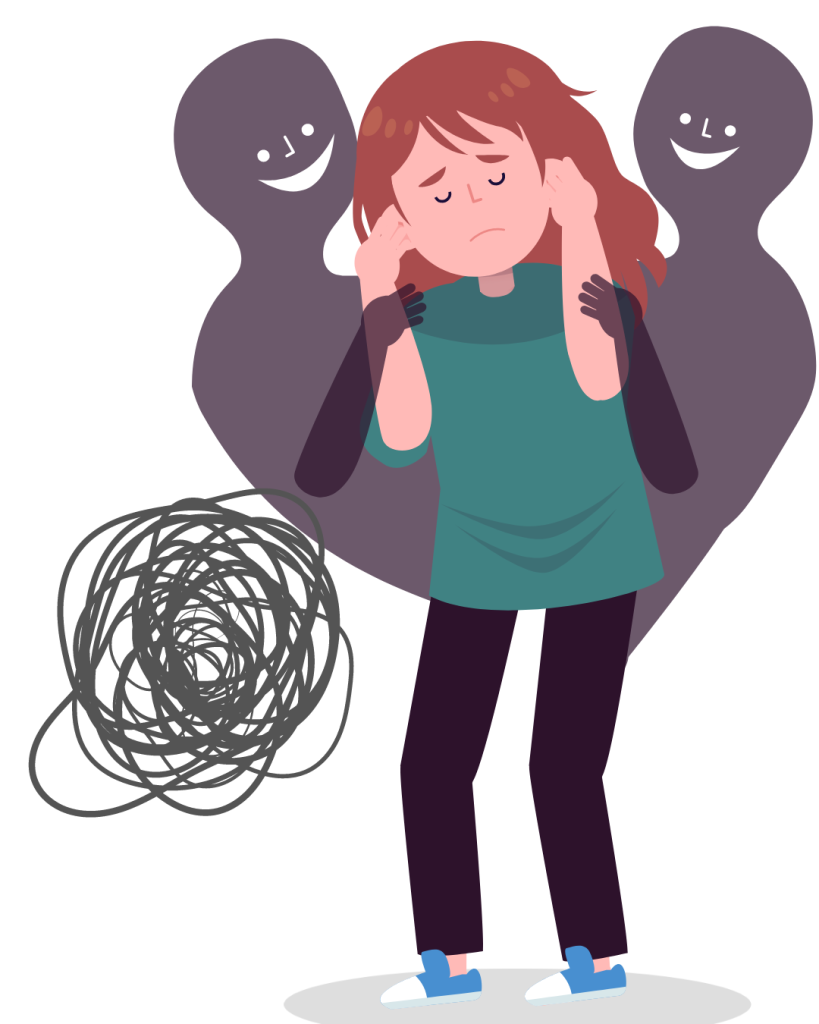Trauma occurs when individuals face highly stressful, frightening, or distressing events that are challenging to manage or beyond their control. This can manifest as a single occurrence or as a prolonged experience over an extended duration.
Many individuals may encounter traumatic events during their lifetime, but the impact can vary greatly among people. Trauma is not confined to a specific age group and its effects can manifest long after the initial event.

What experiences might be traumatic?
There’s no rule about what experiences can be traumatic. It’s more about how you react to them.
Trauma is subjective. It is impossible for others to fully understand the impact of your own experiences on you. While you may share similarities with others, the way you are affected by these experiences can vary greatly in intensity and duration.
Trauma can include events where you feel:
- Frightened
- Under threat
- Humiliated
- Rejected
- Abandoned
- Invalidated, for example your feelings or views have been dismissed or denied
- Unsafe
- Unsupported
- Trapped
- Ashamed
- Powerless
Ways trauma can happen include:
- One-off or ongoing events
- Being directly harmed or neglected
- Witnessing harm to someone else
- Living in a traumatic atmosphere
- Being affected by trauma in a family or community, including trauma that has happened before you were born
Some groups are more likely to experience trauma than others, and experience it more often. They include:
- People of colour
- People who have served or who are serving in the military
- People who are in prison or have been in prison in the past
- Refugees and asylum seekers
- LGBTQIA+ people
- People experiencing poverty
Types of trauma
Many experiences can be traumatic. And we all experience trauma in unique ways. But some experiences or events that lead to trauma are sometimes grouped together and given a name.
These terms normally describe how trauma affects people from certain groups, or in specific situations. This section explains some of these terms:
Childhood trauma
You may have experienced trauma during your childhood. These experiences could make you more likely to have mental health problems as an adult. This is especially if you didn’t have support to manage the trauma. Or if you experienced trauma continuously, over a long period of time.
Collective trauma
Collective trauma is when a traumatic event happens to a large number of people at the same time.
This doesn’t mean that everyone who experienced the event feels the same way about it. Or that they all feel it was traumatic for them. Everyone still copes with it in their own way.
Experiencing collective trauma can mean you experience personal symptoms and ‘social symptoms’. Social symptoms can include how society has dealt with or reacted to the trauma. For example:
- If it isn’t socially acceptable to talk about the event, or only being able to talk about it in certain ways
- If people avoid or discriminate against certain groups that might be unfairly blamed for the trauma
The anniversaries of a collective trauma might lead to events such as memorials and media coverage. You might find these events comforting ways of managing collective trauma. Or you may find them very difficult. How you feel about these anniversaries can also change over time.
Generational trauma
Generational or intergenerational trauma is a type of trauma that’s experienced across generations of a family, culture or group. For example, there’s some evidence that shows children and grandchildren of people who survived the Holocaust experience higher rates of mental health problems.
Trauma that happened in the past has an impact on the mental health of current generations. But it’s not always clear how. Some researchers think trauma may affect our genes. But it’s more likely that trauma affects the environment we grow up in. This can be through things like:
- Stories or warnings older generations have passed on about the trauma they experienced. This could make you wary of the world around you.
- The legacy of trauma continuing to impact your wellbeing and safety, such as the ongoing effects of colonialism on the health and wellbeing of people of colour.
- Trauma affecting how older generations have raised and looked after us. For example, if your parent avoided certain places due to their experience of trauma, you might also feel anxious in those places. This might be more likely to happen if older generations haven’t had support for their traumatic experiences when they needed them.
Moral injury
Moral injury means how you feel when you’re put in a situation that goes against your morals, values or beliefs. It’s often seen in people who have been in situations where they need to make big decisions about other people’s lives.
Moral injury might happen because of:
- Lack of resources provided by a workplace, government or ruling body to treat everyone equally
- Poor safety practices
- Regulations or orders from people in charge that don’t seem to be in people’s best interests
- Unsafe or immoral behaviour from others, particularly those in charge
- Working in a system you see as failing, but have no power to fix
This kind of trauma can impact your view of the world, your government, or the organisation you work for. Along with other effects of trauma, you might:
- Feel a lack of purpose in your personal or professional life
- Feel disconnected from people around you
- Feel betrayed, alienated or ashamed
- Question your moral codes and ethics
If the moral injury happened in the workplace, you might also have difficult feelings about continuing to work there. It can be difficult to seek help in the workplace in these situations. This is because the people running the workplace can be part of the cause of moral injury.
Racial trauma
The impact racism can have on your mind and body is sometimes described as racial trauma.
There’s no universal definition of racial trauma. Some people use it to mean all the effects that encountering racism can have on how we think, feel and behave. Others use it to describe a specific set of symptoms.
Secondary trauma
Secondary trauma is when you witness trauma or you’re closely connected to it. But you don’t experience the trauma directly. It’s sometimes called vicarious trauma.
For example, if you’re a journalist who often reports on traumatic events. Or if you’re a medical professional working in an accident and emergency department.
Effects of secondary trauma are similar to general trauma. But you may find you also begin to feel detached from the trauma. Or treat it as a very separate part of your life.
Experiencing secondary trauma is as valid as any other kind of trauma. It can impact you just as much.
How trauma effects us
Trauma can affect everybody differently. So you might recognise some of the experiences listed on this page. But you might also have experiences or reactions that aren’t mentioned here.
How our bodies respond to danger
When we feel stressed or threatened, our bodies release hormones called cortisol and adrenaline. This is the body’s way of preparing to respond to danger, and we have no control over it.
This can have a range of effects, which are sometimes called:
- Freeze – feeling paralysed or unable to move
- Flop – doing what you’re told without being able to protest
- Fight – fighting, struggling or protesting
- Flight – hiding or moving away
- Fawn – trying to please someone who harms you
If we experience trauma, our body’s reactions can continue long after the trauma is over. For example, when we’re in a situation that reminds us of the trauma. This might affect how we think, feel and behave, especially if recovering from the trauma has been difficult.
How trauma makes us feel
Some of us who go through trauma may have these feelings, during or afterwards:
- Anger
- Numbness or difficulty feeling any strong emotions
- Like you have lost your identity or a sense of who you are
- Scared or panicked
- Grief
- Worried
- Irritable
- Confused
- Restless
- Unsure of what you need or want
- Hypervigilance – which is when you are very alert and aware of your surroundings because you feel something bad might happen
- Shock or horror
- Shame
But not everyone feels the same way during or after trauma. And how we feel can change over time, even months or years after the event. Remember that any feelings are valid – even if you aren’t sure why you’re feeling that way.
Self-blame
When we go through trauma we might feel as if we’re to blame. This can cause very strong feelings of shame or guilt, even if it wasn’t our fault.
Reasons for feeling self-blame include:
- Your mind trying to make sense of what’s happened, and to avoid overwhelming feelings of anger, grief or betrayal
- Finding a way to survive in an unsafe or stressful situation, such as living with someone who’s harmed you
- Wishing you could have done something differently at the time, even though you couldn’t have
- Someone else blaming you for what happened or acting like it was your fault
- Being made to feel responsible for someone else’s actions, even when they had power over you
Self-blame can be very hard to cope with. But it can be a way your mind tries to protect you. So it might take time and support to be able to start feeling differently.
You might feel confused or overwhelmed if someone else says it wasn’t your fault. Although hearing this can also be a relief.
Physical effects of trauma
Trauma can also affect our bodies physically. We might experience:
- Headaches
- Aches and pains around the body
- Shaking
- Tiredness
- Sweating
- Changes to how often we eat or what we feel like eating
- Memory problems
- Dizziness or changes in vision
Trauma is a possible cause of many mental health problems. It can make us more vulnerable to developing them. But for most mental health problems, there are usually other factors involved as well as trauma.



